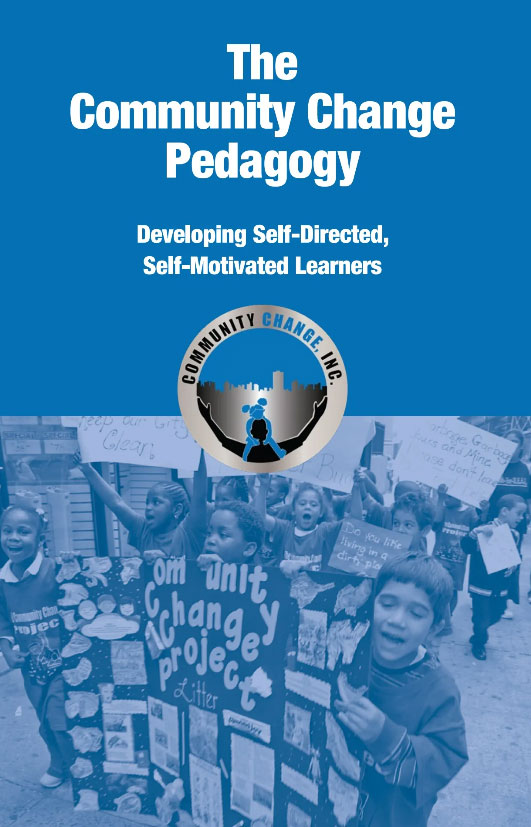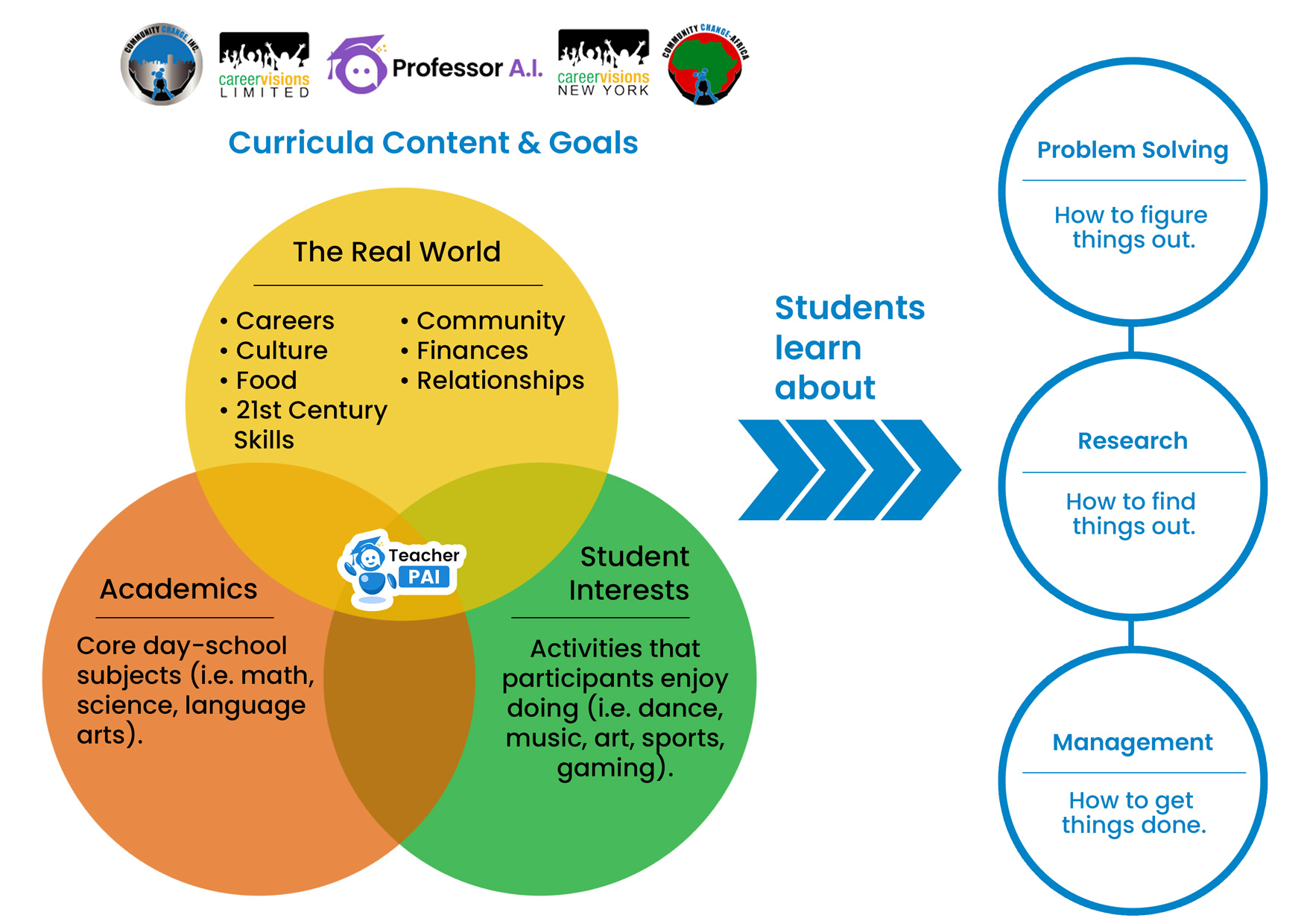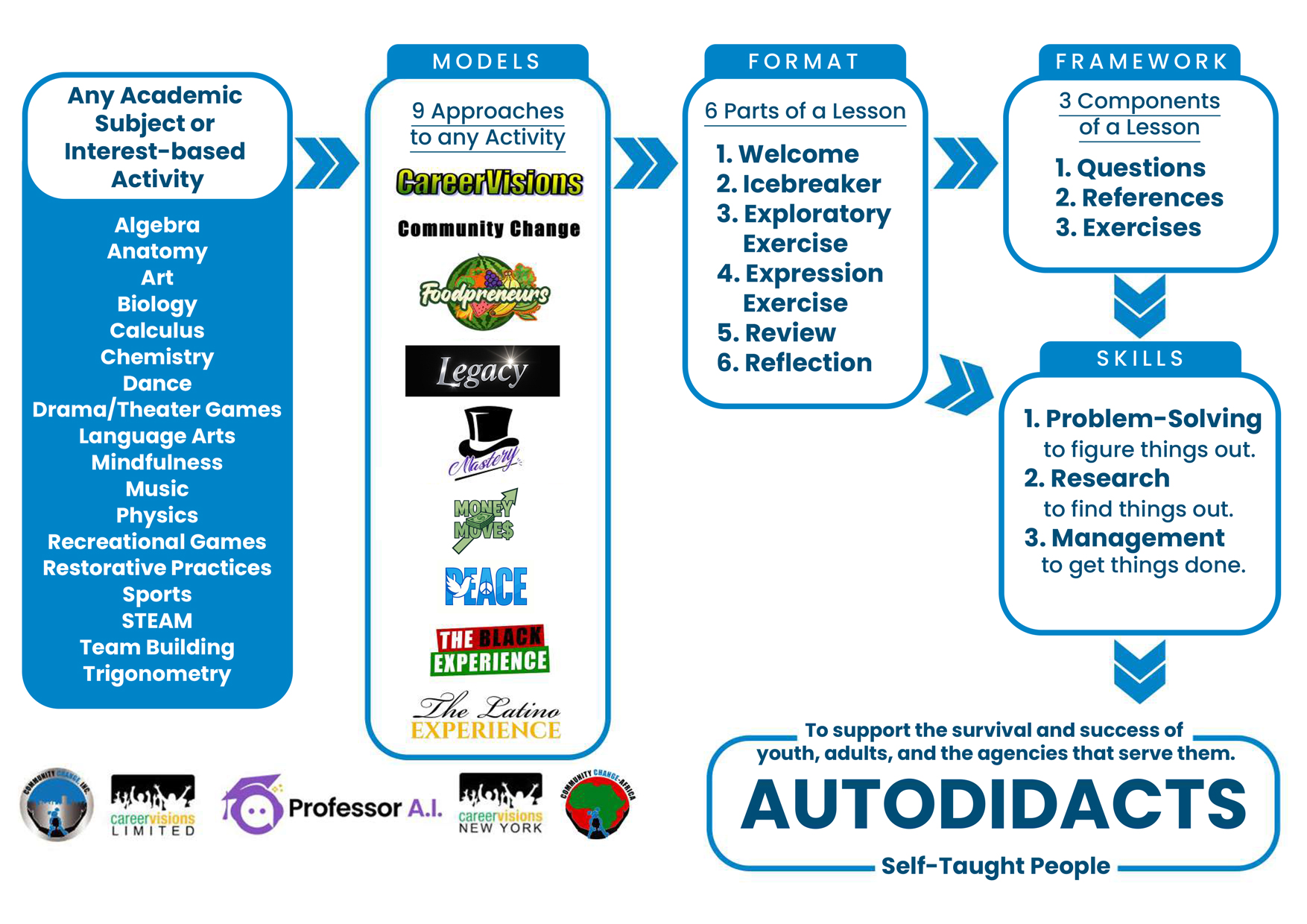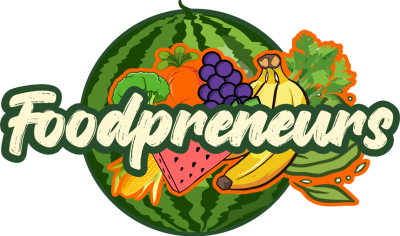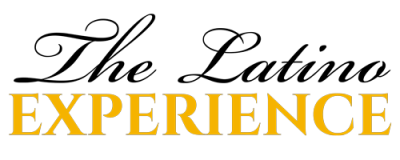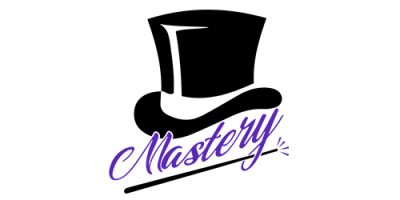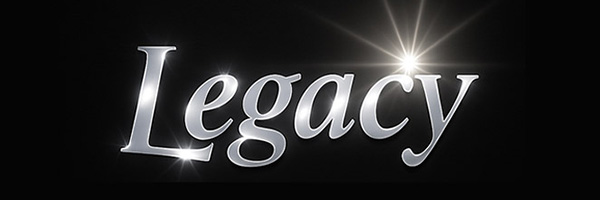Overview
About The Company
Community Change, Inc. (CCI) is a New York-based educational organization committed to supporting the survival and success of youth, adults, and the agencies that serve them. With four subsidiaries (namely, CareerVisions, Ltd., CareerVisions, NY, Professor A.I., and Community Change-Africa), CCI provides real-world, culturally affirming educational services that address academic, personal, and community-based challenges. Since 2009, CCI has impacted over 25,000 students and families, and trained more than 900 educators across nearly 50 agencies. To elaborate, click here!
PROBLEM STATEMENT
Many youth, families, and communities—particularly Black, Latino, immigrant, and low-income populations—continue to face systemic barriers to high-quality, culturally affirming, and real-world-connected education.
Schools and agencies often lack the resources, tools, and approaches to fully engage students, support educators, and deliver programs that build both academic and life success.
Community Change, Inc. and its subsidiaries—CareerVisions, Ltd., CareerVisions, NY, and Professor A.I.—exist to close these gaps. Together, we provide dynamic, project-based, and technology-integrated solutions that empower youth, support families, and build the capacity of schools and organizations to create meaningful change in the lives of those they serve.
APPROACH - THE COMMUNITY CHANGE PEDAGOGY
The Community Change Pedagogy is CCI’s educational approach that cultivates autodidactic (self-directed and self-motivated) learners, blending academics, personal interests, and real-world content. The Community Change Pedagogy is designed to develop students’ critical thinking, research, and executive functioning/management skills.
Each lesson follows a six-step format—welcoming, icebreaker, exploration, expression, review, and reflection—moving students through six phases that build toward real-world action. Whether used in classrooms, afterschool programs, or adult learning settings, this pedagogy is designed to empower individuals to survive and succeed. To elaborate, click here!
SERVICES
CCI offers six adaptable services: 1. Youth Programs, 2. Parent/Family/Community Engagement, 3. Staff Development, 4. Curriculum Development, 5. Strategic Planning, and 6. Grant Writing. These services are available individually or bundled. For instance, the Comprehensive Youth Program Services package provides afterschool programming, staff coaching, family workshops, custom curriculum using Teacher PAI, student showcases, and community action projects—delivering holistic support to districts and agencies seeking sustained impact. To elaborate, click here!
PROGRAMS
CCI has three types of programs:
- Program Models (9): These core models explore real-world themes such as career development, civic engagement, cultural heritage, financial literacy, and more.
- Focus Activity Programs (3): These offer enrichment through arts, STEAM, and academic support. Focus Activity Programs are integrated with any of the nine Program Models.
- Focus Group Programs (3): These provide affinity-based support for boys (Brotherhood), girls (Sisterhood), and students in temporary housing or foster care (Pathway to Power). Focus Group Programs are integrated with any of the nine Program Models.
Each program is project-based, age-appropriate, and suitable for use in school-day, afterschool, or summer settings.
To elaborate, click here!
SPECIAL EVENTS
Community Change, Inc. hosts four signature special events throughout the year at our comprehensive youth program sites. These are showcases of learning and community impact by participants. Each event offers a platform for students and families to share what they’ve learned and accomplished in our programs.
- The Bazaar – A marketplace-type event where students display the findings of their explorations and community partnerships.
- The Expo – A creative showcase where students deliver artistic performances about the things they learned in the program.
- The Convention – A youth-led conference for students to present social justice, civic action, or legacy projects and lead peer workshops.
- The Day of Action – A public rally and community service event where students lead a demonstration through their school building and/or community to raise awareness about the prevalence, causes, effects, and interventions of their neighborhood concerns.
PARENT & FAMILY ENGAGEMENT
To strengthen school-family partnerships, CCI offers seven engagement activities, including in-person/virtual workshops, resource sessions, advisory councils, special events, and action projects. These services are designed to build parent knowledge and involvement using the same pedagogy applied with youth. CCI also offers professional development for parent coordinators and AI-powered tools to generate customized family workshops and literacy curricula. To elaborate, click here!
COMMUNITY CHANGE, INC.’S STRATEGIC PLAN
Community Change, Inc. provides educational services that prepare youth and adults for the real world. Our project-based approach combines academic content and personal interests with real world themes, allowing for engaging and meaningful learning experiences for participants.
We offer six services to nonprofits and to educational institutions:
1. Youth Engagement (pre-K – 12th Grade);
2. Parent, Family & Community Engagement;
3. Professional Development;
4. Curriculum Development;
5. Strategic Planning; and
6. Fund Development.
For each service area, we offer programs that provide clients with strategies for engaging participants in exploring any of the following real-world themes: careers, community issues, cultural awareness, financial literacy, the food industry and relationships.
Vision: The long-term change we seek to create.
Community Change, Inc. envisions youth and adults who have what it takes and does what it takes to support the survival and success of themselves, their families and their community.
Mission: Our primary purpose. This is our "why".
Community Change, Inc.’s mission is to make our community a better place to live!
Goals: The primary results we want to achieve across all services.
1. To cultivate autodidactic (self-directed/self-taught) learners
2. To advance the development of learning organizations amongst nonprofits and educational institutions
Objectives: Service-specific targets that advance our goals.
Service #1. Youth Engagement Objective. To provide pre-K through 12th grade students with academically aligned, interest-based, project-based learning experiences about the real world that strengthen critical thinking, research, and executive-functioning skills.
Service #2. Parent, Family & Community Engagement Objective. To provide parents, families, and community members with learning experiences that support children’s education, strengthen families, and improve connections to schools and the broader community.
Service #3. Professional Development Objective. To provide professional learning experiences that strengthen the ability of teachers, coordinators, directors, and support staff to design, facilitate, and oversee academically aligned, interest-based, project-based learning experiences about the real world.
Service #4. Curriculum Development Objective: To provide agencies with adaptable, project-based, interest-based curricula and resources for pre-K–12 youth and adults that integrate academic content with real-world applications.
Service #5. Strategic Planning Objective. To provide learning experiences that strengthen agencies’ capacity to engage in continuous improvement and optimize organizational efficiency and effectiveness.
Service #6. Grant Writing / Fund Development Objective. To provide assistance to organizations in securing funding that support youth, family, and community programs.
Strategy/Approach: The method used to achieve our objectives. This is our "how".
Community Change, Inc.’ developed the Community Change Pedagogy to achieve our objectives. The Community Change Pedagogy is a project-based, real-world learning approach designed to develop critical thinking, research, and executive functioning skills. By integrating academic content with participant interests, the Community Change Pedagogy is intentional about providing meaningful and engaging learning experiences.
To implement this strategy across each of our services, the Community Change Pedagogy is interwoven into 16 Programs that structure the engagement of individuals and agencies around specific, real world themes, namely careers, community issues, cultural awareness, financial literacy, the food industry and relationships.
Our Targeted Programs are derived from our model programs, enabling them to adapt to a specific activity, geographic area, or population.
1. Model Programs (9) – Our standard, real-world theme-based programs grounded in the Community Change Pedagogy.
- CareerVisions – Our approach for engaging participants in learning about career exploration, job readiness, and entrepreneurship
- Community Change – Our approach for engaging participants in learning about civic engagement, service learning, and social issues
- Foodpreneurs – Our approach for engaging participants in learning about healthy eating, culinary arts, and the food industry
- Legacy – Our approach for engaging participants in learning about culture and diversity
- The Black Experience – Our approach for engaging participants in learning about Black Studies
- The Latino Experience – Our approach for engaging participants in learning about Latino Studies
- Mastery – Our approach for engaging participants in learning about 21st-century and life skills
- Money Move$ – Our approach for engaging participants in learning about financial literacy, entrepreneurship, and investing
- Peace – Our approach for engaging participants in learning about conflict management, restorative practices, and healthy relationships
a. Target Activity Programs (3) – Our interest-driven programs structured according to the Community Change Pedagogy, using any Model Program to guide the learning experience.
- Creative Expressions – Our approach for engaging participants in learning about the arts
- Genius! – Our approach for engaging participants in learning about science, technology, engineering, agriculture, and math (STEAM)
- Level Up! – Our approach for engaging participants in learning about academic support, transitioning to high school, and college readiness
b. Target Population Programs (3) – Our targeted support programs structured according to the Community Change Pedagogy, using any Model Program to guide the learning experience.
- Brotherhood – Our approach for engaging participants in learning about male mentorship and personal development
- Sisterhood – Our approach for engaging participants in learning about female mentorship and personal development
- Pathway to Power – Our approach for engaging participants in learning about stability and leadership development for students in temporary housing and foster care
c. Target Area Program (1) – Our place-based program structured according to the Community Change Pedagogy, using any Model Program to guide the learning experience.
- Street Smarts – Our approach for engaging Harlem participants in learning about the real-world using either credible educators or teaching artists who have deeply rooted history in Harlem.
ACTION STEPs/Tactics: The activities we use to deliver programs
Service #1: Youth Engagement Action Steps/Tactics (3)
1. Youth workshops aligned with any of the 16 programs
- Youth Workshops delivered using the Community Change Pedagogy format:
i. Welcome
ii. Icebreaker
iii. Exploratory Exercise
iv. Expression Exercise
v. Review
vi. Reflection
2. Community action projects addressing real neighborhood concerns
• Recruitment – outreach to involve community in planning and implementing action.
• Selection – choosing an action that addresses the causes/effects of the issue.
• Tasks & Timeline – delegating who is going to do what and by when for the action.
• Implementation – making the action happen.
• Reflection – sharing feedback about the successes, challenges and suggestions of the project.
3. Special events showcasing learning experiences:
- The Bazaar: student-led pop-up shop/street fair
- The Expo: student-led talent show
- The Convention: conference with student-led mini-workshops
- The Day of Action: student-led pep rally/demonstration
Measured by the number of sessions and participants in attendance
Service #2: Parent, Family & Community Engagement Action Steps/Tactics (7)
1. Global virtual workshops focused on economic development and fatherhood
2. School-based workshops (virtual/in-person) informed by local needs assessments
- Global and School-based workshops delivered using the Community Change Pedagogy format:
i. Welcome
ii. Icebreaker
iii. Exploratory Exercise
iv. Expression Exercise
v. Review
vi. Reflection
3. Community Resource Information Sessions connecting families to local supports
4. School Resource Information Sessions connecting families to school-based services
5. Advisory Council meetings with families, community members, and stakeholders
6. Family-engaged community action projects
7. Participation in special events that showcase learning experiences
Measured by the number of sessions and participants in attendance.
Service #3: Professional Development Action Steps/Tactics (4)
1. Customized staff workshops for teachers, parent coordinators, and related personnel
2. Collaborative planning session/meetings
3. Instructional, individualized coaching through observation, modeling, and feedback
4. Training Academies: virtual courses supporting program design and implementation aligned with the Community Change Pedagogy
Measured by the number of sessions and participants in attendance.
Service #4. Curriculum Development Action Steps/Tactics (2)
1. Customized curriculum packages, guides, and manuals
- Includes lesson plans, worksheets, assessments, and tip sheets across all 16 programs
2. Use of Teacher PAI as the A.I.-powered curriculum development resource
Measured by number of curriculum guides and lesson plans created.
Service #5: Strategic Planning Action Steps/Tactics (3)
1. Development of strategic plan.
2. One-on-one, executive coaching on leadership, data management, parent/family/community engagement, and sustainability
3. Team meetings focused on leadership, data management, parent/family/community engagement, and/or sustainability
Measured by number of plans created, sessions, and participants in attendance.
Service #6. Grant Writing / Fund Development Action Steps/Tactics (3)
1. Identification and pursuit of funding opportunities
2. Development of proposals in alignment of funding strategies for program continuation, expansion, and replication
3. Submission of proposals
Measured by number of funded proposals and amount of dollars awarded.
Our communities are at a turning point.
Youth and adults are being asked to succeed in a fast-changing world without being given the tools to navigate it. Too many learning environments still operate as if memorization alone is enough, while real life demands problem-solving, adaptability, leadership, and self-direction. The result is a widening gap between what people are taught and what they actually need to survive and succeed.
Young people deserve learning experiences that feel real, relevant, and empowering. They need to understand how academics connect to careers, community issues, money, culture, relationships, and their own future. Families need support and meaningful opportunities to strengthen their role in their children’s education and build stronger connections to schools and community resources. Educators and community leaders need practical, usable frameworks—not disconnected trainings—that help them consistently design and deliver learning experiences that work.
Across schools and nonprofit organizations, capacity is stretched thin. Programs are often fragmented, curriculum resources are limited, and long-term planning and funding remain constant challenges. Without a clear, shared approach, even strong efforts struggle to create lasting impact. Too often, programs address symptoms rather than building the skills and systems needed for sustained success.
This moment calls for a unified approach—one that builds skills, confidence, and leadership in individuals while strengthening the organizations that serve them.
Community Change, Inc. exists for this moment. Our work is grounded in a simple belief: when people learn how to learn, how to adapt, and how to act with purpose, communities change. We envision youth and adults who have what it takes and do what it takes to support the survival and success of themselves, their families, and their community. Through real-world, project-based learning experiences that connect academics to their realities, we equip youth, families, educators, and organizations to take charge of their lives and their futures.
The Community Change Pedagogy is our educational approach that cultivates autodidactic (self-directed and self-motivated) learners by blending academics, personal interests, and real-world content with classroom, school and community learning experiences.
The framework of this approach features three key elements: questions for inquiry; references for research and information; and exercises for creative explorations and expressions. This framework helps to deliver an engaging and effective learning experience. The recommended minimum frequency for implementing this pedagogy is twice weekly over 14 weeks, which is roughly one semester.
Each lesson begins with a welcome and icebreaker to introduce the focus question. The lesson then progresses with exploratory and expression exercises that engage students with various references and encourage them to creatively apply what they have learned. In the exploratory exercise, students use articles, videos, and guest speakers to explore and analyze information related to the focus question. Following this, the expression exercise allows students to creatively share their findings from the references through activities they enjoy. Each lesson concludes with a review and reflection segment, allowing students to summarize their learning experience and to share their feedback.
The Community Change Pedagogy includes nine project-based units or models that organize students’ exploration around specific themes:
- CareerVisions for career exploration.
- Community Change for civic engagement.
- Foodpreneurs for culinary arts.
- Legacy for cultural education.
- The Black Experience for Black Studies.
- The Latino Experience for Latino Studies.
- Mastery for 21st-century skills.
- Money Move$ for financial literacy.
- Peace for conflict management, relationship education, and restorative practices.
Each unit promotes personal growth, career explorations, cultural awareness and social responsibility.
Each unit includes one special event and one action project. Special events are presentations or performances where students creatively showcase the things that they learned to an audience of their peers, family, and community members. During special events, community members are the audience, observing and appreciating the students’ work. In contrast, action projects allow students to address real-world challenges by getting community members directly involved in planning and implementing an intervention to a local issue. This collaborative approach ensures that community members are active participants, working with students to develop and execute an action plan that combats neighborhood concerns.
The Community Change Pedagogy makes education engaging and relevant. It encourages students to take ownership of their learning while developing problem-solving, research, and management skills. The consistent and continuous application of the Community Change Pedagogy with fidelity allows for the cultivation of self-directed, autodidactic learners.

Four Characteristics of the Community Change Pedagogy
1. Integration
- Blends academics, interest-based activities, and real-world content to create meaningful, engaging lessons.
- Lessons explore real-world themes including career readiness, civic engagement, identity, financial literacy, and conflict resolution.
- Exploratory exercises connect ELA, math, science, social studies and other academic subjects with culturally relevant, project-based sequential lessons.
- Expression exercises can incorporate any interest-based activity, including but not limited to such as coding, swimming, fashion, culinary arts, debate, poetry, and dance.
2. Customizable
- Lessons can be modified by educators using the AI-powered Teacher PAI platform.
- Designed to address all age groups, academic subjects, interest areas, and real-world topics.
- Schools, districts, and agencies can choose from 15 program options, including models focused on career readiness, financial literacy, civic engagement, restorative practices, multicultural identity, entrepreneurship, and Black or Latino studies.
- Exploratory exercises use articles, videos, and primary sources to spark critical thinking and connect students to real-world perspectives.
- Expression exercises are tailored to student interests, making every lesson personally relevant.
3. Adaptable
- Effective in K–12 classrooms, afterschool programs, family literacy settings, shelters, and adult education environments.
- Appropriate for diverse populations, including students in temporary housing, foster care, and emergent multilingual learners (EMLLs).
- Works in both in-person and virtual environments across a wide range of program settings.
4. Structured
- Each project follows the six-phase Community Change Pedagogy, guiding students from identity exploration to community action.
- Each lesson includes six sequential components: Welcome, Icebreaker, Exploratory Exercise, Expression Activity, Review, and Reflection.
- Curriculum is aligned with academic standards, social-emotional learning (SEL) competencies, and 21st-century skills.
- Project-based learning that culminates in student-led action projects and special events.
- K-12 Lessons
- Parent Workshops
- Community Action Projects
- Special Events
- Professional Development
Below are sample age-appropriate lessons/workshops from each of our educational programs that demonstrate the amazing power and creativity of Teacher PAI. Based on the Community Change Pedagogy, each one-hour lesson can cover up to two content areas and include two to three types of activities.
- Elementary School

Civic Engagement
- Elementary School

Culinary Arts
- Middle School

Black Studies
- High School

Relationship Education
- High School

Black Studies
- High School

Latino Studies
- Parents/Adults

Career Explorations
- Parents/Adults

Relationship Education
- Parents/Adults
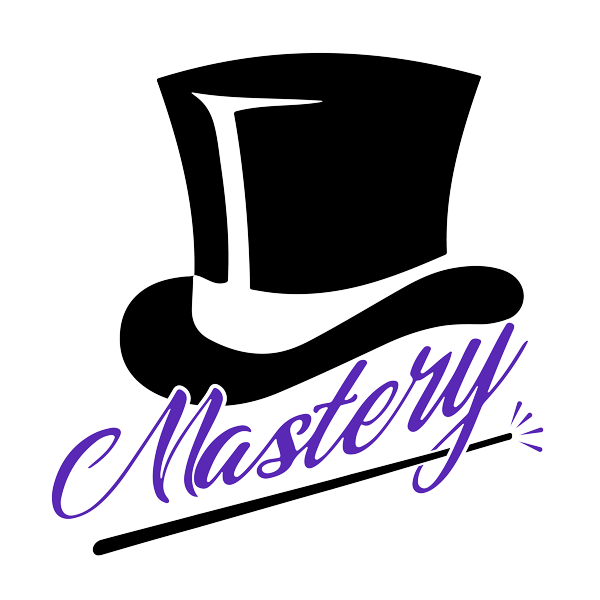
21st Century Skills

Community Change, Inc.
Legal Name: Community Change, Inc.
Business Type: Education, Youth Development, and Community Development Organization
Year Began Operations: 2009
Geographic Service Area: National
Delivery Modes: In-person, virtual, and hybrid
Website: www.communitychangeinc.com
Email: kf@communitychangeinc.com
Phone: 917.674.8269
UEI: Available Upon Request
SAM.gov Registration: Active / Available Upon Request
Insurance: General liability, professional liability, and workers’ compensation coverage maintained in accordance with federal, state, and local contracting requirements
Organizational Overview
Community Change, Inc. (CCI) is a national education, youth development, parent engagement, and community development organization supporting the survival and success of youth, adults, and the agencies that serve them. CCI delivers structured, scalable services to schools, districts, nonprofit organizations, institutions of higher education, and government agencies at the local, state, and federal levels.
To ensure consistency, quality, and scalability, CCI offers Teacher PAI (Pedagogical Artificial Intelligence) to agencies as a resource for designing pre-school through 12th grade and adult education curricula that is designed to simultaneously address academic content, participants’ interests, and real-world challenges.
Pedagogical Framework & Instructional Technology
CCI’s instructional approach integrates academic content, participant interests, and real-world challenges. Instruction is designed to develop participants critical thinking, research and executive functioning/management skills through engaging exploratory and expression exercises.
Teacher PAI (Pedagogical Artificial Intelligence) is CCI’s proprietary, A.I.-powered curriculum development platform used across services to generate structured, project-based sequential, lessons aligned with CCI’s instructional approach. Teacher PAI enables educators and partner agencies to create up to five, high-quality and engaging lessons at a time, customize instruction by age group and audience type, maintain fidelity across multiple sites, and reduce staff workload.
Six Core Services
Youth Programs
CCI implements meaningful, high-engagement programming for pre-K–12 youth and adult learners using structured, project-based lessons. Programming integrates academic skills with interest-based activities to explore real-world themes while reinforcing attendance, punctuality, participation, and executive functioning.
Parent, Family & Community Engagement
CCI offers a comprehensive suite of services to strengthen school-family-community connections, including virtual and in-person workshops, community resource sessions, advisory councils, special events, and action projects that actively engage families and community stakeholders.
Staff Development
CCI provides professional learning for educators, teaching artists, social workers, and administrators focused on effective implementation of the Community Change Pedagogy. Training is delivered through workshops, coaching, and an online Training Academy, and may include Continuing Teacher and Leader Education (CTLE) credit for New York State educators.
Curriculum Development
CCI designs courses and curriculum guides for pre-K–12 youth and adults centered on real-world themes. This service includes licensing access to Teacher PAI, enabling agencies to generate customized, standards-aligned lessons with consistency and scalability.
Strategic Planning
CCI supports agency leadership through coaching and facilitated planning sessions that guide the development of strategic plans, strengthen organizational culture, and address programmatic and operational challenges.
Grant Writing
CCI provides comprehensive grant writing and fund development services, supporting agencies in identifying, pursuing, and securing government funding opportunities aligned with organizational capacity and mission.
Programs
CCI provides agencies with structured, project-based programs in the following thematic areas:
- Career exploration and workforce readiness
- Civic engagement and social action
- Culinary arts, healthy eating, and food systems
- Culture and diversity
- Black studies, history, and culture
- Latino studies, history, and culture
- 21st-century and life skills
- Financial literacy and economic development
- Conflict management and relationship education
- Arts-based learning and creative expression
- Science, technology, engineering, agriculture, and mathematics (STEAM)
- Academic support and college readiness
- Male-focused mentoring and leadership development
- Female-focused mentoring and leadership development
- Specialized supports for students in temporary housing
Integrated Service Delivery
Services may be offered as stand-alone engagements or bundled into comprehensive solutions. For example, CCI’s Comprehensive Youth Program Services package integrates in-school and afterschool youth programming; staff training and coaching; parent and family engagement activities; curriculum development using Teacher PAI; special events to showcase youth learning; and community-based action projects.
This integrated approach ensures academic, engagement, and community goals are addressed simultaneously while supporting long-term sustainability.
Capacity & Performance Metrics
- Year Began Operations: 2009
- National Service Reach: Multi-state implementation capability
- Annual Sites Supported: 30+
- Youth & Adults Served Annually: 1,000+
- Educators & Facilitators Managed Annually: 300+
- Sessions Delivered Annually: 3,000+
- Start-Up Readiness: Immediate upon contract execution
Applicable NAICS Codes
- 611710 – Educational Support Services
- 611430 – Professional and Management Development Training
- 611110 – Elementary and Secondary Schools (Support Services)
- 624110 – Child and Youth Services
- 541611 – Administrative Management and General Management Consulting Services
- 541715 – Research and Development in the Social Sciences and Humanities
- 541511 – Custom Computer Programming Services (A.I.-enabled curriculum systems)
- 541512 – Computer Systems Design Services
Point of Contact
Kenyatta Funderburk
Executive Director
Community Change, Inc.
Phone: 917.674.8269
Email: kf@communitychangeinc.com
Website: www.communitychangeinc.com
- Scroll Up




